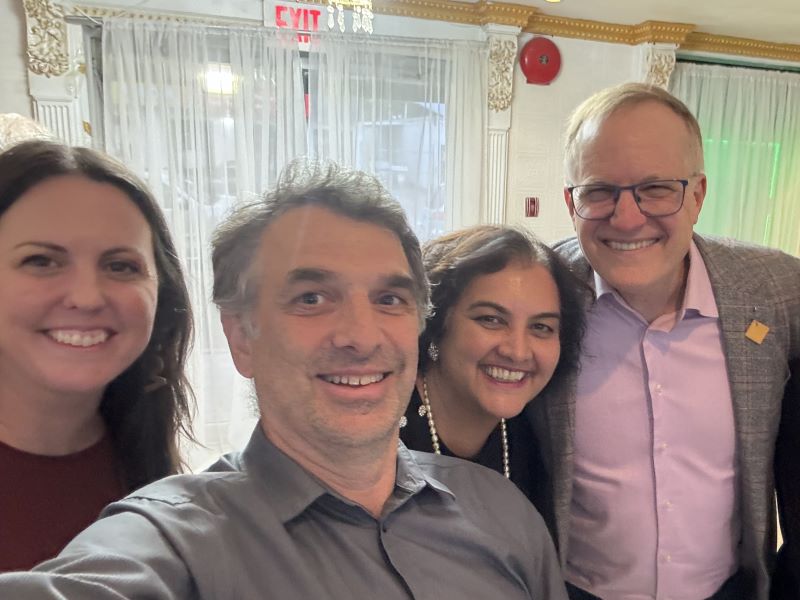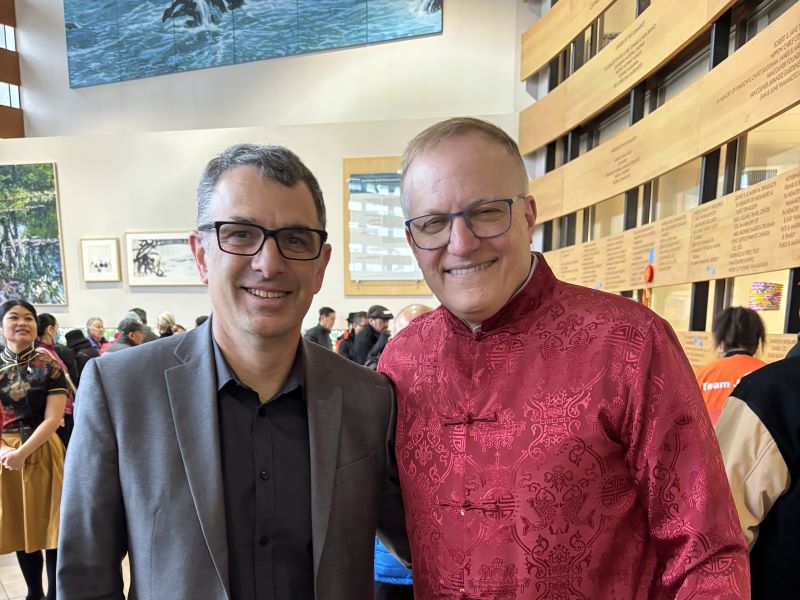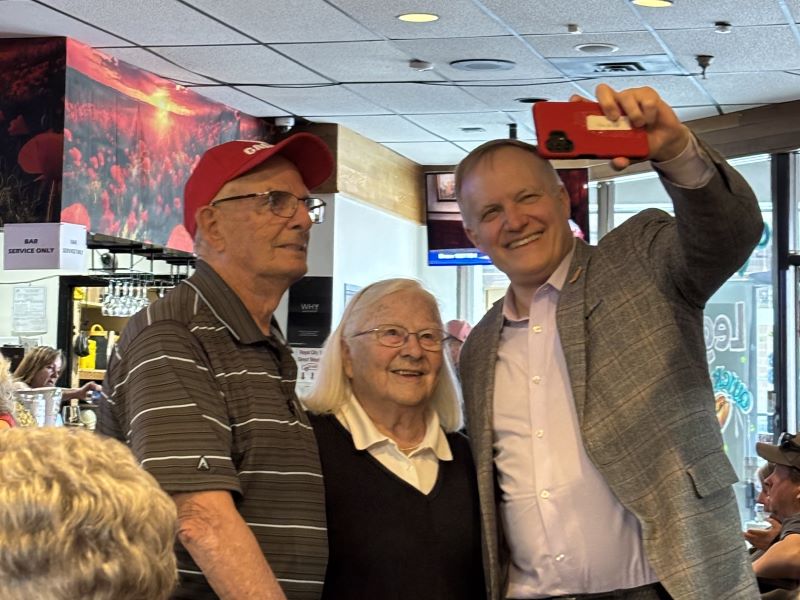The things I wrote on this website used to be more political than they are now, and a lot more partisan. No shame, those things are still there in the archives, but since I am in this new role, I am trying to keep this page about what’s happening, about policy and outcomes, as there is lots of room elsewhere for the bickering part of the job (I engage in bit more of that at times over in my Newsletter, subscribe here). This post however, will be partisan and political, and maybe a bit personal. You are warned.

Peter Julian is an inspiring leader, was an incredible Member of Parliament, and I thank him for his service to the community and for his friendship.
I have said many times before, I expect a lot of a Member of Parliament. They need to be a bold voice for their community in caucus and Parliament, they need to push progressive policy in Ottawa that reflects the needs of our community but also builds our strength as a Country, and they need to be present here in community helping people connect with a distant and vague federal bureaucracy. Peter excelled at all three, which is amazing when you consider he never served in government caucus in his two decades of work.
Peter has been incredibly helpful in taking the concerns of our community to Ottawa, and in assuring our community was supported by the federal government. There are many examples, but even in the last year: his role in helping get my face in front of the Federal Minister of Housing so I could repeatedly make the case for New Westminster as an excellent Housing Accelerator Fund opportunity means more than $11 Million came here to better support housing affordability, housing diversity, and accelerated permitting and approval processes at the City. Peter’s support was instrumental in us getting $1.4 Million from the Emergency Treatment Fund to help pay for the Three Crises Response Pilot: the second largest ETF grant for any municipality in Canada, and the only grant given in BC. This is helping us move more firmly and faster addressing the combined crises of homelessness and untreated mental health and addictions. These are real, tangible wins for our community on the key issues affecting our community.
Peter was also instrumental in the federal NDP’s forcing of the minority Liberal government to bring in the biggest new social programs since before the lost decade of Mulroney: dental care, Pharmacare, and childcare programs are on the Federal agenda in part because of Peter’s work as House Leader. His work to make workplaces safer, to end corporal punishment of children, to assure COVID relief went to working people and those in need not just banks; to bring in new Anti-Scab legislation, there is a long list of substantive work Peter accomplished from the opposition and third party benches in Ottawa. He made a difference at the national level.
All along, Peter ran one of the more proactive constituency offices in the country, helping people manage immigration hiccups, get access to support programs to which they are entitled, and helping folks navigate the sometimes-challenging income tax and federal support programs designed to help those most in need on our community. When you attend a Peter Julian Christmas or Lunar New Year event, it is always remarkable to see the number of people who come up to thank Peter for the help he and his constituency staff had provided them personally. It would be hard to imagine a more effective liaison between Ottawa and his constituents than Peter. He’s also a renowned hard worker in the House, a brilliant spokesperson for working and vulnerable people, and a hell of a nice guy.

I have been lucky to call Peter a friend for most of my time in New West. I remember the first time I really met him, I bought one of those “Dinner with the Member of Parliament” silent auction prizes, and my partner and I met Peter in a local pub. We had a few beers. Immediately it was clear he was an engaged listener, though I’m not sure he exactly knew how to take this loud opinionated guy who kept going on about bike lanes. He took it all in stride and with his characteristic class, and it ended up being the first of many, many conversations about community, about public policy, about working for change, and about leadership – conversations that continue to this day. In my elected life, Peter always answered the phone, always had time to hear about a problem or an idea, and was always quick to think about how he, the Federal Government, or someone else in his broad local network, could help. In that sense, he is a mentor and a support system as well as a friend.
Thank you Peter for everything you have done for the community that you love. I know you aren’t going away, the fight in you is too strong, and that love too strong.

Nothing here should be read as a slight to Jake Sawatzky. He won fair and square, and he seems like a really dedicated and engaged guy. I have heard him speak and think his heart is in the right place. I don’t envy the learning curve he is facing, but wish him nothing but the best in getting up to speed on this really important task, because his success in his role is our success as a community.
However, looking at this from the political side, I honestly don’t know what his win means. The election was for most of the night a statistical three-way tie between people who, by conventional campaign wisdom, should not have been in a tie. One is a long-established and highly respected candidate who might have the most famous name in the city and who ran a well designed and executed voter identification and GOTV campaign. The second was a young and inexperienced person whose name was completely unknown in the community two weeks after the writs dropped who had little visible campaign machinery. The third was a familiar if not well known local business man who was dropped in at the last minute to replace a turfed candidate that still ran against him. No disrespect at all to Indy Panchi or Jake Sawatzky, but on pure old-fashioned local campaign paper, it should not have been close. But it was.
At the surface level, it’s clear what happened: people voted nationally for the Prime Minister they wanted. They paid more attention to the Poll Aggregators and Vote Strategically campaigns than before. (IMHO) Poilievre ran on not-being-Trudeau and people’s fears of their neighbours while Carney ran on not-being-Poilievre and people’s fears of our neighbour to the south. Singh tried (unsuccessfully) to earn the credit he deserved for major new social programs while trying to take up space vacated by the Liberals by running messages about middle-class affordability until the campaign saw the writing on the wall and fell back on also-not-being-Poilievre. But re-imagining last month’s messaging isn’t what I want to talk about, I’m sure they all made sense in their respective campaign bubbles at the time.
Instead, I wonder what it means when community no longer sends a representative to Ottawa, but instead Ottawa sends representatives for us to choose between. I know there has always been an aspect of the latter in our system, but I wonder what it means to the kind of politics I’m interested in – local organizing, talking directly to people, building community and taking local action and being present. I add this to the ongoing questions about how we even tell our local stories when there is no local journalism, our local conversation is increasingly moderated by social media algorithms, and bad actors seem interested in driving wedges between us for shit and giggles. Can we support our community and scale it outward? Will anyone care? I don’t want to go down the “Western Alienation” route, but how will Ottawa know about New West, and how will our values keep us together as democracy re-structures itself around the rest of the world going to hell?
So last Friday I got together with a couple of dozen people doing good things in this community, or interested in doing those good things, and I hope they will help me in a conversation about what’s next. Because community has to come first.